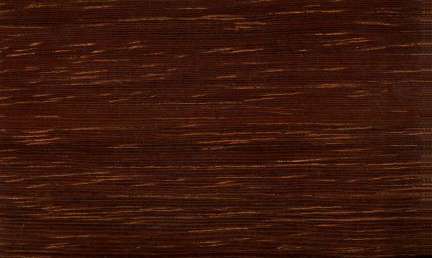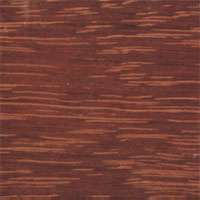 
Ekki (Lophira alata)
Family: Ochnaceae
Common names: A koura, Aba, African oak, Akoga, Akogka, Akogo, Akpakpla, Asore, Azobe, Bakundu, Bankile, Belengbe, Bokoka, Bongossi, Bonkole, Eba, Ebba, Ekki, Eleba, Endui, Endwi, Enwan, Esire, Esore, Faboy, Gue, Hendui, Ipawhaw, Ironpost, K'deng, Kaku, Kekrefunde, Kokank, Kotublassu, Kunu, Kyere, Kyirafunti, Kyirebente, Lihos, Liku, Malah, Meni oil tree, N'goule, Namijin-kadai, Ngohou ibenga, Ngokele, Nokue, Okikopom, Okoa, Okoga, Okoka, Okut, Oteng, Otugba, Ozobe, Parapara, Plu, Pone, Prenkebi, Red ironwood, Red oak, Umawerek, Umpenek, Yasua
Distributed in: Cameroon, Congo, Equatorial Guinea, Gabon, Ghana, Ivory Coast, Liberia, Nigeria, Sierra Leone, Zaire (Africa)
Distribution overview: Azobs found in Cameroon, the Congo Basin, Cd'Ivoire, Equatorial Guinea, Gabon, Ghana, Liberia, Nigeria, Sierra Leone, and Zaire. It grows in evergreen and moist deciduous forests, in freshwater swamp forests and close to river banks. Although this species has a definite preference for wet evergreen areas, it is assumed to be sensitive to non-evergreen forest soils and is unsuccessful on rocky soils. L. alata is a pioneer species and is representative of a disturbed forest. It is also sensitive to drought
Common uses: Agricultural implements, Boat building (general), Bridge beams, Bridge construction, Bridge joists, Charcoal, Crossties, Decks, Dockwork, Domestic flooring, Flooring, Flooring: industrial heavy traffic, Fuelwood, Harbor work, Heavy construction, Joinery (external): ground contact, Joinery, Light construction, Marine construction, Mine timbers, Parquet flooring, Piling, Posts, Railroad ties, Sporting Goods, Sub-flooring, Tables, Truck bodies, Turnery, Vats, Vehicle parts, Wharf construction
Product sources: The ITTO reports that the species is a regular source of timber for export.Although the population of the species is relatively secure, supplies of Ekki in the lumber form are limited, especially on the N. American market. The material is easier to obtain in Europe in the form of flooring, vats and other containers for liquids.
Environment profile: Data source is World Conservation Monitoring Center
Ekki is secure within its natural growth range in the Ivory Coast and the Congo, but it is officially classified as Vulnerable in Cameroon. Its status in the wild is currently listed as unknown because of insufficient information in Equatorial Guinea, Gabon, Ghana, Liberia, Nigeria, Sierra Leone, and Zaire
Tree size: Trunk diameter is 100-150 cm
Colors: the heart isReddish brown, Yellowand the sapwoodWhite, Yellow.The grain isStraight, the textureUnevenand the lusterMedium
Natural durability: Very durable, Very durable
Odor: No specific smell or taste
LightInduced Color Change: Darker
Kiln Schedules: Kiln Drying Rate (in days) is slow
Kiln Drying Rate: Slow (18-28 days for boards < 32 mm, to 52-84 days for boards >= 63 mm)
Drying Defects: Severe end splitting, Severe surface checking
Ease of Drying: Slowly
Tree Identification: Bole/stem form is straight
Comments: General finishing qualities are rated as good General finishing qualities are rated as satisfactory Uses for Ekki are rather limited because it is very difficult to machine
Blunting Effect: Blunting effect on sawing dry wood is severe
Boring: Difficult
The wood tends to char during boring. Timber should be held firmly during boring operations to prevent chatter
Carving: Heartwood is very difficult to treat
Cutting Resistance: Cutting Resistance with green wood is easy
Gluing: Fairly Difficult to Very Difficult
Mortising: Fairly Easy to Very Easy
Moulding: Very Good to Excellent
Movement in Service: Very Good to Excellent
Nailing: Fairly Easy to Very Easy, Pre-boring recommended
Planing: Very Good to Excellent
Resistance to Impregnation: Sapwood is resistant
Response to hand tools: Severe blunting effect on cutters
Routing recessing: Routing is difficult
Sanding: Very Good to Excellent Results
Steam bending: Very poor
Screwing: Pre-boring recommended, Requires pre-boring before screwing. ; Turning: Fairly Easy to Very Easy
The coarse wood is very difficult to use in turnery work, and tools are dulled rather rapidly
Painting: Good; Polishing: Very Good to Excellent; Staining: Satisfactory staining properties; Varnishing: Good;
- Numerical data Metric
- Numerical data English
- Strength properties
- References
 |
 |
 |
 |
| Item |
Green |
Dry |
Metric |
| Specific Gravity |
0,82 |
0,94 |
|
| Density |
|
993 |
kg/m3 |
| Bending Strength |
1049 |
1692 |
kg/cm2 |
| Crushing Strength |
677 |
924 |
kg/cm2 |
| Hardness |
|
1430 |
kg |
| Impact Strength |
|
137 |
cm |
| Shearing Strength |
|
222 |
kg/cm2 |
| Stiffness |
143 |
174 |
1000 kg/cm2 |
| Tangential Shrinkage |
10 |
|
% |
| Radial Shrinkage |
7 |
|
% |
| Weight |
1009 |
945 |
kg/m3 |
| Maximum Load |
0,84 |
1,19 |
cm-kg/cm3 |
| Toughness |
|
706 |
cm-kg |
| Static Bending |
|
|
kg/cm2 |
|
 |  |  |  | | Item | Green | Dry | English | | Bending Strength | 14928 | 24077 | psi | | Density | | 62 | lbs/ft3 | | Hardness | | 3153 | lbs | | Impact Strength | | 54 | inches | | Maximum Crushing Strength | 9643 | 13146 | psi | | Shearing Strength | | 3162 | psi | | Stiffness | 2041 | 2482 | 1000 psi | | Toughness | | 613 | inch-lbs | | Work to Maximum Load | 12 | 17 | inch-lbs/in3 | | Specific Gravity | 0.82 | 0.94 | | | Weight | 63 | 59 | lbs/ft3 | | Radial Shrinkage | 7 | | % | | Tangential Shrinkage | 10 | | % | | Volumetric Shrinkage | 17 | | % | |
Density (dry weight) = 61 - 67 lbs/cu. ft. 0
Density (dry weight) = 67-75 lbs/cu. ft. 0
Max. crushing strength = very high 0
Shearing strength (parallel to grain) = very high 0
Hardness (side grain) = very hard 0
Modulus of Elasticity (stiffness) = high 0
Bending strength (MOR) = very high 0
Shrinkage, Radial = large 0
Shrinkage, Tangential = large 1
Bending strength (MOR) = high 1
Shrinkage, Tangential = fairly large
Max. crushing strength = high
Modulus of Elasticity (stiffness) = very high
Modulus of Elasticity (stiffness) = medium
Density (dry weight) = 53 - 60 lbs/cu. ft.
Shrinkage, Tangential = moderate
Shrinkage, Radial = fairly large
Density (dry weight) = > 75 lbs/cu. ft.
Work to Maximum Load = medium
Toughness-Hammer drop (Impact Strength) = high
Shrinkage, Tangential = small
Shrinkage, Radial = small
Shrinkage, Radial = moderate
Shearing strength (parallel to grain) = high
Modulus of Elasticity (stiffness) = low
Hardness (side grain) = hard
Bending strength (MOR) = medium
Toughness (total work) = low
Arno, J. 1992. Lophira alata - Ekki. In A Guide to Useful Woods of the World. Flynn Jr., J.H., Editor. King Philip Publishing Co., Portland, Maine. 1994. Page 212-213.Banks, C.H. and J.P. Schoeman. 1963. Railway Sleeper and Crossing Timbers. Bulletin No. 41, Republic of South Africa. The Government Printer, Pretoria, South Africa.Banks, C.H., Schoeman, J.P., Otto, K.P.,1977,The Mechanical Properties of Timbers with particular reference to South,Africa,South African Forestry Research Institute Bulletin,(Ed.,Schoeman, J.P. 1973 & Otto K.P. 1976,No.48Banks, C.H.,1954,The Mechanical Properties of Timbers with Particular Reference to those,grown in the Union of South Africa,Journal of the South African Forestry Association,No. 24 pp.44-65,[South,African Forestry Journal]Banks, C.H.,1970,The Durability of South African Wood and Wood Base Building Materials,South African Forestry Journal,No.75Bentum, A.L.K.,1969,Properties of Ghanian Timbers - Kaku,Ghana Forest Products Research Institute Technical Newsletter,3(1,pp27-29Bois et Forets des Tropiques,1976,Azobe (Lophira alata,Bois et Forets des Tropiques,No.170, pp35-50Bolza, E., Keating, W.G.,1972,African Timbers - the Properties, Uses and Characteristics of 700 Species,C.S.I.R.O. Div. of Building ResearchBond, C.W.,1950,Colonial Timbers,Sir Issac Pitman & Sons Ltd. LondonBoone, R.S., C.J. Kozlik, P.J. Bois, E.M. Wengert. 1988. Dry Kiln Schedules for Commercial Hardwoods - Temperate and Tropical. USDA, Forest Service, General Technical Report FPL-GTR-57, Forest Products Laboratory, Madison, Wisconsin.Brown, W.H.,1969,Properties and uses of Tropical hardwoods in the United Kingdom. Part 1,Nonstructural properties and uses.,Conference on Tropical hardwoods SC-5/TN-5, Syracuse UniversityBrown, W.H.,1978,Timbers of the World No.1 Africa,TRADA, Red Booklet SeriesChalk, L.,1933,Twenty West African Timber Trees,Forest Trees and Timbers of the British Empire,Part 2Chudnoff, M.,1984,Tropical Timbers of the World,U.S.A. Department of Agriculture, Forest Service, Forest Products,Laboratory, Madison.Cooper, G.P., Record, S.J.,1931,The Evergreen Forests of Liberia,Yale School Forestry Bulletin,31,pp1-153Eggeling, W.J.,1940,Indigenous Trees of Uganda,Govt. Printer Entebbe UgandaErfurth, T., Rusche, H.,1976,The Marketing of Tropical Wood A. Wood Species from African Moist Forests,F.A.O. Forestry DepartmentFarmer, R.H.,1972,Handbook of Hardwoods,HMSOForest Products Research Laboratory, U.K.,1950,The Seasoning Properties of Exotic Timbers,Forest Products Research Laboratory, Princes Risborough, Department of,Science and Industrial Research Leaflet,No.44 and supplements 1 & 2Forests Products Research Laboratory, U.K.,1956,A Handbook of Hardwoods,Forest Products Research Laboratory, Princes Risborough, Department of,Science and Industrial Research, Building Research EstablishmentFrance - C.T.F.T.,1966,Bois Tropicaux,C.T.F.T. Publ.,12France - C.T.F.T.,1973,Investigations and Tests carried out on Tropical Timber by several,Research Laboratories,CTFTFrance - C.T.F.T.,1977,Promotion of African Timbers - New Species,CTFT,35 LeafletsFrance - C.T.F.T.,Recuil de Fiches Techniques,C.T.F.T.France - Comite Nacional des Bois Coloniaux,1931,Etude Physique et Mecanique des Bois Coloniaux,Assoc. Colonies-Sciences & Comite National des Bios Coloniaux, Paris,,FranceGhana - Timber Marketing Board,1969,Ghana Hardwoods,Timber Marketing BoardGutierrez Oliva, A., Plaza Pulgar, F.,1967,Caracteristicas fisico-mecanicas de las maderas Espanolas. (Physical and,mechanical properties of Spanish timbers.,Min.Agric./Dir.Gen Montes/Instituto Forestral de Investigaciones,y,Experiencias, Madrid pp102Hedin, L.,1930,Etude sur la Foret et les Bois du Cameroun,Haut-Commissaire de la CamerounHMSO.1981.Handbook of Hardwoods, 2nd Edition.Revised by R. H. Farmer.Department of the Environment, Building Research Establishment, Princes Risborough Laboratory, Princes Risborough, Aylesbury, Buckinghamshire.Hoheisel, H.,1968,Identification of some Colombian wood Sp. and their possible use on the,basis of physical and mechanical properties,Latin American Forest Research and Training Institute, Merida VenezualaHughes, J.F.,1971,The Principal Timber Trees of Cameroon,Unpublished dataIrvine, F.R.,1961,Woody Plants of Ghana,O.U.P. LondonITTO.1986.Tropical Timber Atlas, Volume 1 - Africa.International Tropical Timber Organization (ITTO) and Centre Technique Forestier Tropical (CTFT, 45bis, Avenue de la Belle Gabrielle, Nogent-sur-Marne Cedex, France.Jay, B.A.,1968,Timbers of West Africa,TRADA, Red Booklet SeriesKeay, R.W.J.,1964,Nigerian Trees Vol.2,Nigeria Federal Department of Forest Research, IbadanKennedy, J.D.,1936,Forest Flora of Southern Nigeria,Government Printer LagosKinloch, D., Miller, W.A.,1949,Gold Coast Timbers,Govt. Printer Gold CoastKloot, N.H., Bolza, E.,1961,Properties of Timbers Imported into Australia,C.S.I.R.O. Forest Products Division Technological Paper,No.12Kryn, J.M., Forbes, E.W.,1959,The Woods of Liberia,U.S.A. Department of Agriculture,Forest Products Laboratory, Madison,,Report No. 2159Kukachka, B.F.,1970,Properties of Imported Tropical Woods,Forest Research Paper FPL 125Lavers, G.M.,1983,The Strength Properties of Timber (3rd ed. revised Moore G.L.,Forest Products Research Laboratory, Princes Risborough, Building Research,Establishment Report (formerly Bulletin No.50)Lincoln, W.A. 1986. World Woods in Color. Linden Publishing Co. Inc., Fresno, California.Patterson, D.,1988,Commercial Timbers of the World, 5th Edition,Gower Technical PressPieters, A.,1977,Essences Forestieres du Zaire,R.U.G. Gent BelguimRendle, B.J.,1969,World Timbers (3 Vols.,Ernest Benn Ltd. LondonReyes, L.J.,1938,Philippine Woods,Commonwealth of the Philippines Department of Agriculture and Commerce,Technical Bulletin,No.7Saint-Aubin, G. de,1963,La Foret du Gabon,CTFT Publ., No.21Sallenave, P.,1955,Proprietes Phyiques et Mecaniques des Bois Tropicaux de l'Union Francaise,C.T.F.TSallenave, P.,1964,Proprietes Physiques et Mecaniques des Bois Tropicaux (Premier Supplement,C.T.F.T. Publ.,no.23Sallenave, P.,1971,Proprietes Physiques et Mecaniques des Bois Tropicaux (Deuxieme,Supplement,C.T.F.T.Savill, P.S., Fox, J.E.D.,1967,Trees of Sierra LeoneScott, M.H.,1950,Notes on the more Important African Timbers Imported into the Union with,Special Ref. to Port. E.A. Species,Journal of the South African Forestry Association,No.19,pp18-62,[South,African Forestry Journal]Spalt, H.A., Stern, W.L.,1957,Survey of Africa Woods 3,Tropical Woods 16(107) pp92-128T.R.A.D.A.,1982,Timbers for river and sea constructions,TRADA Wood Information Section 0, Sheet 6Timber Development Association Ltd.,1955,World Timbers (3 Vols.,Timber Development Association Ltd.U.A.C.O. Timber Review,1971,Some Straight forward information about a very strong and very durable,wood,U.A.C.O. Timber Review,20,pp12-3U.K. - Colonial Forest Resources Development Department,1939,British Colonial Timbers - Woods recommended for Various Uses,Colonial Forest Resources Development Department,LondonUganda Forest Department,1956,Osan,Uganda Forestry Department Timber Leaflet,No.28Unwin, A.H.,1920,West African Forests and Forestry,T. Fisher Unwin Ltd. LondonVoorhoeve, A.G.,1965,Liberian High Forest Trees,Centre for Agric. Publishing and Documentation, WageningenWood, B., Calnan, D.,1976,Toxic Woods,British Journal of Dermat 94 Suppl. 13
|









